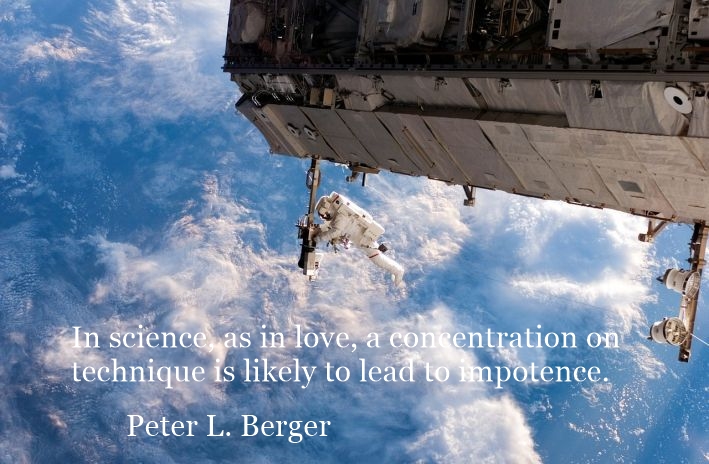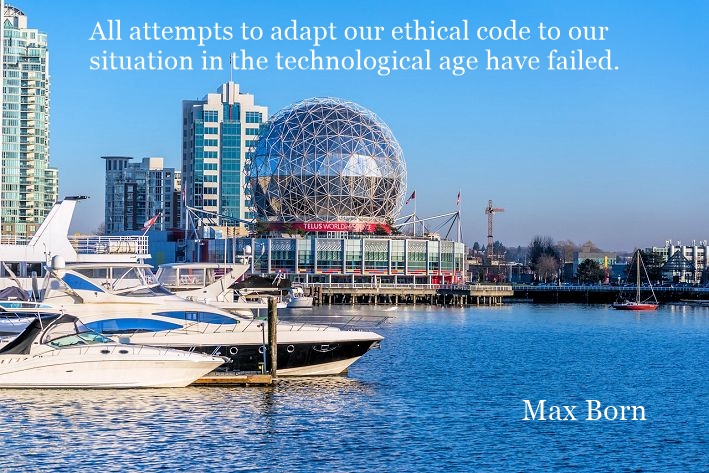
Technology definitions, quotes, news, links, resources and marketing strategies to enlarge a useful scientific klnowledge of our world and its possibilities.
In the absence of a paradigm or some candidate for paradigm, all of the facts that could possibly pertain to the development of a given science are likely to seem equally relevant… Because the crafts are one readily accessible source of facts that could not have been casually discovered, technology has often played a vital role in the emergence of new sciences.
Thomas Kuhn, “The Structure of Scientific Revolutions”
Gradually, the aspect of science as knowledge is being thrust into the background by the aspect of science as the power of manipulating nature. It is because science gives us the power of manipulating nature that it has more social importance than art. Science as the pursuit of truth is the equal, but not the superior, of art. Science as a technique, though it may have little intrinsic value, has a practical importance to which art cannot aspire.
Bertrand Russell
A vast technology has been developed to prevent, reduce, or terminate exhausting labor and physical damage. It is now dedicated to the production of the most trivial conveniences and comfort.
B. F. Skinner
All of our exalted technological progress, civilization for that matter, is comparable to an axe in the hand of a pathological criminal.
Albert Einstein
America’s technology has turned in upon itself; its corporate form makes it the servant of profits, not the servant of human needs.
Alice Embree
Anything that is theoretically possible will be achieved in practice, no matter what the technical difficulties are, if it is desired greatly enough.
Arthur C. Clarke
Darwin recognized that thus far the civilization of mankind has passed through four successive stages of evolution, namely, those based on the use of fire, the development of agriculture, the development of urban life and the use of basic science for technological advancement.
Frederick Seitz
In science, as in love, a concentration on technique is likely to lead to impotence.
Peter L. Berger
If science fiction is the mythology of modern technology, then its myth is tragic
Ursula K. Le Guin
Scientific principles and laws do not lie on the surface of nature. They are hidden, and must be wrested from nature by an active and elaborate technique of inquiry.
John Dewey
All attempts to adapt our ethical code to our situation in the technological age have failed.
Max Born
It has become appallingly obvious that our technology has exceeded our humanity.
Albert Einstein
No category of sciences exists to which one could give the name of applied sciences. There are science and the applications of science, linked together as fruit is to the tree that has borne it.
Louis Pasteur
Clarke’s Third Law:. Any sufficiently advanced technology is indistinguishable from magic.
Arthur C. Clarke

Technology, general term for the processes by which human beings fashion tools and machines to increase their control and understanding of the material environment. The term is derived from the Greek words tekhne, which refers to an art or craft, and logia, meaning an area of study; thus, technology means, literally, the study, or science, of crafting.
Many historians of science argue not only that technology is an essential condition of advanced, industrial civilization but also that the rate of technological change has developed its own momentum in recent centuries. Innovations now seem to appear at a rate that increases geometrically, without respect to geographical limits or political systems. These innovations tend to transform traditional cultural systems, frequently with unexpected social consequences. Thus technology can be conceived as both a creative and a destructive process.
The meanings of the terms science and technology have changed significantly from one generation to another. More similarities than differences, however, can be found between the terms.
Both science and technology imply a thinking process, both are concerned with causal relationships in the material world, and both employ an experimental methodology that results in empirical demonstrations that can be verified by repetition. Science, at least in theory, is less concerned with the practicality of its results and more concerned with the development of general laws, but in practice science and technology are inextricably involved with each other.
The varying interplay of the two can be observed in the historical development of such practitioners as chemists, engineers, physicists, astronomers, carpenters, potters, and many other specialists. Differing educational requirements, social status, vocabulary, methodology, and types of rewards, as well as institutional objectives and professional goals, contribute to such distinctions as can be made between the activities of scientists and technologists; but throughout history the practitioners of “pure” science have made many practical as well as theoretical contributions.
Indeed, the concept that science provides the ideas for technological innovations and that pure research is therefore essential for any significant advancement in industrial civilization is essentially a myth. Most of the greatest changes in industrial civilization cannot be traced to the laboratory. Fundamental tools and processes in the fields of mechanics, chemistry, astronomy, metallurgy, and hydraulics were developed before the laws governing their functions were discovered.
The steam engine, for example, was commonplace before the science of thermodynamics elucidated the physical principles underlying its operations. In recent years a sharp value distinction has grown up between science and technology. Advances in science have frequently had their bitter opponents, but today many people have come to fear technology much more than science. For these people, science may be perceived as a serene, objective source for understanding the eternal laws of nature, whereas the practical manifestations of technology in the modern world now seem to them to be out of control.
Several alternatives to this contemporary technological dilemma have been suggested. For example, one concept formally instituted in the U.S. has been that of technology assessment. At present, government regulatory commissions, the court systems, and the insurance industry provide the most common means for assessing the effects of technological innovations on human life. In the U.S., a congressional Office of Technology Assessment was established in the late 1970s and charged with the responsibility of evaluating the social, economic, environmental, and health effects of projects and devices. It has been very difficult in practice, however, to predict secondary effects of new technologies.

Many people who have little faith in comprehensive planning and technology assessment have advanced the concept of so-called appropriate, or intermediate, technology as an alternative to the technological problems of the industrialized nations, and as a solution to the problem of social dislocation caused by the transfer of advanced technologies to developing countries. In his Small Is Beautiful (1973), the British economist E. F. Schumacher stated that – for humane, aesthetic, moral, and political reasons – the overwhelming nature of modern technology threatens a quality of life that has meaning, freedom of choice, a human sense of scale, and an equal chance for justice and individual creativity.
Supporters of this viewpoint have proposed a value system in which all people recognize that the earth’s resources are limited and that human life must be structured around a commitment to control the growth of industry, the size of cities, and the use of energy. Restoration and renewal of natural resources has become the technological objectives of the appropriate-technology alternative.
Another school of thought, technological determinism, argues that modern society is no longer living in the industrial age of the 19th and earlier 20th centuries. They argue that postindustrial society is already a reality, and that the complex sociotechnical networks mediated by advanced electronics have made obsolete the institutions of nationalistic governments, capitalistic corporations, and heavily populated cities.
Twentieth-century technology spread from Europe and the U.S. to other major nations such as Japan and the Soviet Union. It has not, however, pervaded all the countries of the world, by any means. Some so-called developing nations have never experienced the factory system and other institutions of industrialization. The leaders of such countries tend to feel that the acquisition of modern weapons and new technology will provide them with power and prestige.
No one, however, can predict the religious, social, and cultural consequences of the transfer of technologies to these countries. In fact, some of the most severe social dislocations during recent decades have occurred in regions where radical changes caused by technology transfer have taken place; Uganda and Iran are two unhappy examples.
Technology has always been a major means for creating new physical and human environments. It is possible to ask today whether technology will also destroy the global civilization that human beings have created.
Don’t miss these other great posts:
Best quotes and aphorisms on AI

